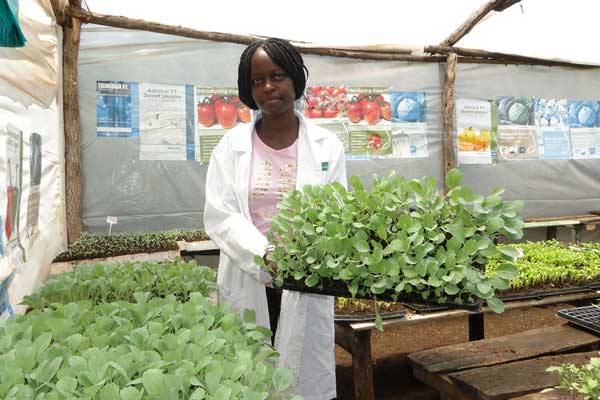As she grew up in Kiserian, on the outskirts of Nairobi, MaryAnne Wairimu was always saddened that farmers struggled in vain to have all their seedlings germinate after transplanting.
She watched helplessly as tomatoes, cabbages and onions wilted and died. “But I also saw a business opportunity and when I was old enough, I could not let it pass,” says Wairimu.
“While in college, I researched on how to attain 100 per cent germination rate for various seedlings. I learnt about a technology known as hygro-mix,” recalls Wairimu.
After graduating in 2012 from the Kenya Polytechnic with a diploma in Physics, Wairimu, 23, started farming at her parents’ one-acre farm in Kiserian using hygro-mix, which is a soil-less technology. The capital was Sh100,000, part of which she used to put up a greenhouse measuring five by 10 metres.
She further bought hybrid seeds and hygro-mix trays. A packet of 10,000 seeds of capsicum cost Sh30,000 while 2,500 tomato seeds went for Sh8,000.
IMPORTED EQUIPMENT
The young woman, who runs Gad Eden Greenhouses and Nurseries, imported hygro-mix equipment from South Africa.
“The yield from seedlings made from the technology is higher and one does not waste seeds during the transplanting ” says Wairimu.
She now has two large greenhouses where she grows all varieties of horticultural crops that include tomatoes, capsicum, onions, cabbages, cucumber, broccoli, cauliflower, beetroot, spinach and kale.
With the help of her mother, Lister Kinuthia, Wairimu waters the plants at least once a day depending on the weather.
Normally, tomato seeds stay in the nursery for about 21 days while capsicum takes five weeks before maturity.
The seedlings are then sold to farmers in Nairobi, Kisumu, Chavakali, Mombasa and Kampala.
“Farmers book the seedlings even before they are fully developed,” says Kinuthia.
Tomato and capsicum seedlings retail at Sh10 each, while kale and spinach go for Sh2 and lettuce and beetroot at Sh3.
“For out-of-town orders, we use courier services to send the seedlings to farmers,” says Wairimu.
Mother and daughter have proved to be a dynamic and formidable team. They are also experimenting with various seed varieties and teaching farmers from as far as Nigeria how to achieve 100 per cent seed germination. The two are also growing onion seeds as well using soil since the crop requires plenty of space, which might not be available in a greenhouse.
“The onions take about six to seven weeks to mature. We use drip irrigation to water them,” says Kinuthia.
According to Wairimu, farmers must debunk the myth that drip irrigation is too expensive and complex.
“We also teach farmers how to succeed in drip irrigation. A good drip system for an eighth acre costs a farmer about Sh30,000,” she says.
In a good month, mother and daughter make up to Sh200,000 from selling seedlings and teaching farmers.
“Breeding seedlings is very profitable as everyone is farming these days. Greenhouse farmers will always need hybrid seedling,” says Wairimu.
Germination success rate is dependent of the seed quality. “The advantage of soil-less medium is that it can be sterilised completely and chances of seed rotting are minimal,” says Dr Miriam Mwangi, a senior lecturer in the crop, horticulture and soils department at Egerton University. She adds farmers should ensure seeds germinate in right temperature.








